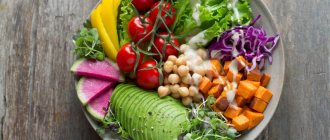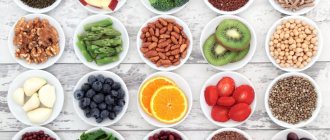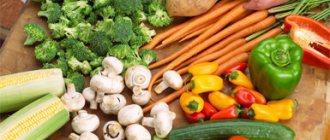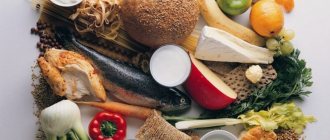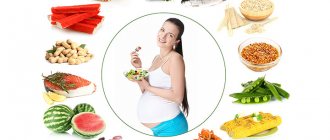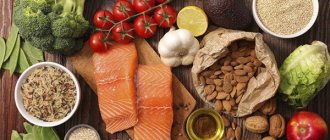What constitutes a healthy diet?
Eating healthy food doesn't have to be overly complicated. While some specific foods or nutrients may have a beneficial effect on your mood, it's the overall picture of how you're feeling that's most important. The cornerstone of a healthy diet should be replacing processed foods with unprocessed foods as much as possible. Eating food the way nature intended it can make a huge difference to your health.
All this time we were so worried about eating right, carefully counting calories and weighing portion sizes, reading different diets and eating as many fruits and vegetables as we could, we forgot about the main thing - when we ate it! Because according to research, the time you eat can have a huge impact on your weight loss, and your overall well-being.
Light dinner: rules and recipes
The myth that people who are losing weight should not eat after six has long been debunked. By refusing an evening meal, we create too much time during which the body does not receive nutrients. As a result, he begins to store fuel “in reserve,” gaining extra pounds from breakfast and lunch, so that he can then use it up during a forced hunger strike.
It turns out that by refusing dinner in order to lose weight, we get the opposite effect. Therefore, there must be dinner! But not just anyone.
Dinner according to all the rules
First of all, dinner should be nutritious in order to replenish strength after a hard day, and at the same time low in calories, approximately 25-30% of the total calorie intake, in order to have time to digest before bed.
What to eat for dinner with proper nutrition
It is an established fact that you need to have dinner 3-4 hours before you go to bed. This time is allotted for the body to digest food and absorb all nutrients. When you eat healthy, your dinner should contain the following foods:
Protein: The best way to plan a healthy dinner is to start by choosing a good source of protein. Chicken is a common choice, but there are other healthy options. Let's look at some of them:
- Fish. Dorado, tuna, hake and other fish are great for your dinner because they are rich in protein and very tasty. Many varieties of fish also contain important omega-3 fatty acids. Avoid breaded and various frozen fish products, always use high-quality and fresh fish.
- Beef. This meat is an excellent source of protein, but should be consumed in reasonable portions. Try grilled steak or filet mignon; the meat should not be fatty.
- Eggs. Although it may seem strange to eat eggs for dinner, an egg white omelet with vegetables can be a good dinner.
- Vegetables and Greens: The best healthy dinner includes a wide variety of vegetables.
So, after you choose your protein, fill the rest of your plate with your favorite vegetables and greens. Fresh peppers, spinach, carrots, red chard, zucchini and cucumber, dill, parsley, and green lettuce add color and flavor to your dinner.
A dinner based on the principles of proper nutrition is very simple - just two components: Protein and Vegetables. This is the key to your health and beauty.
Healthy Dinner Techniques
Your cooking technique can make a huge difference between a healthy meal and a dinner loaded with unnecessary fat and calories. Grilling, steaming, and roasting meats and vegetables are great for preparing a proper dinner because you don't need to use a lot of fat. Stay away from recipes that involve breading or frying. These cooking methods require you to use oil, which doesn't add much flavor but will add calories and unnecessary fat.
Portion size matters
Recently, serving sizes have emerged. An approximate dinner portion should be 200g. But if you don't have a kitchen scale, visual cues can help with portion sizes. Your serving of protein should be the size of a deck of cards, and half a cup of vegetables or salad should be the size of a traditional light bulb. If you don't feel satisfied after dinner, add more leafy greens.
How to make vegetables tastier?
While simple salads and steamed vegetables can get boring quickly, there are many ways to add flavor to your vegetable dishes.
Add color. Not only do brighter, more colorful vegetables contain higher concentrations of vitamins, minerals and antioxidants, but they can add flavor and add visual appeal to dishes. Add color using fresh tomatoes, roasted carrots or beets, and roasted sweet, colorful peppers.
Cook green beans, broccoli, Brussels sprouts and asparagus in a new way. Instead of boiling or steaming these vegetables, try grilling them or baking them in the oven with spices. This will liven up your dinner and make it less boring.
More verdant greens. Kale, arugula, spinach, broccoli and bok choy are all rich in calcium, magnesium, iron, potassium, zinc and vitamins A, C, E and K. To add flavor to your salad greens, try drizzling them with olive oil.
Knowing the basic principles of constructing a healthy dinner, it will not be difficult for you to eat healthy and healthy. Finding time to prepare food is another matter. Busy people have neither the energy nor the time for dinner. But even in such situations there is always a way out.
Healthy dinner: what foods you can and should eat in the evening
The eternal question “What should I eat to lose weight?” becomes especially relevant in the evening. Dinner is the most vulnerable part of the daily diet. It often happens like this: “I don’t want to have breakfast, I’ll make do with a cup of coffee.” No time for lunch, coffee and a roll. Afternoon snack - coffee and candy. Here comes dinner. What will I eat? I will do everything!” Do not do it this way. Even if during the day the food was chaotic and unhealthy, dinner may well be simple and healthy.
Protein products
The healthiest part of dinner is protein-rich foods. Fish, seafood, meat, poultry, eggs, caviar and dairy products. Protein is a building material for muscles, blood vessels and the entire body. It is at night that muscle tissue is restored due to the digestibility of protein.
Here's what nutritionist Dr. A.V. Kovalkov says: “I recommend that my patients eat a couple of boiled proteins before going to bed. Don't be confused: not a couple of eggs, but a couple of egg whites! People ask me: “Why does the egg white have to be boiled?” The amino acid chains of egg white are found in it in the form of individual molecules, rolled into balls, which are very quickly and well absorbed. When eggs are boiled, some of the bonds in the proteins are broken. Protein molecules swell, straighten, become tangled, and make it harder for the body to absorb them. As a result, egg white remains in the stomach all night, gradually being absorbed and supporting you with amino acids. All night long, while you don’t eat anything!” (Source: Kovalkov A.V. Losing weight wisely! Methodology of Dr. Kovalkov. M: Eksmo, 2014 - 400 pp.).
It is better to take protein products with low fat content. For example, eggs without yolks, chicken breast, steamed fish, low-fat cottage cheese. There is no need to load the body with fats overnight, otherwise they will immediately be deposited in problem areas.
Dairy products
Contains protein and minimal calories. The main thing here is to pay attention to your body. Some people experience swelling after eating dairy products. Others do not have such problems. It is difficult to say for sure whether you can drink fermented milk products at night or not. Experiment and listen to your body.
Vegetables and greens
For dinner they are suitable raw, boiled, baked in foil or grilled. Vegetables contain vitamins, microelements, and fiber. However, the calorie content of many vegetables depends on the cooking method. In their raw form, they contain few calories and act on the body like bran - they remove food debris from the digestive system and cleanse the intestines. And when boiled, their glycemic index increases sharply.
Glycemic index (eng. glycemic (glycaemic) index, abbreviated as GI) is a relative indicator of the effect of carbohydrates in food on changes in blood glucose levels (hereinafter referred to as blood sugar levels).
The GI scale is defined as follows: 0 units - minimum carbohydrates, 100 units - maximum carbohydrates. The more units in a product, the faster it is absorbed, increasing blood sugar. On the Internet you can find detailed tables with the glycemic index of foods. For example, fresh carrots - 35 units, boiled - 85 units; raw beets - 30 units, boiled - 65 units, besides, boiled vegetables are digested faster. Therefore, for dinner it is better to prepare a salad of raw green vegetables with parsley, dill, and lettuce.
Citrus
Fruits contain a lot of sugars/carbohydrates, so you should eat them before 16 hours. However, there is a group of fruits that can be eaten for dinner. These are citrus fruits, especially grapefruit and pomelo. Their calorie content is 32-38 kcal per 100 grams. Contains a lipolytic enzyme that can break down fats.
Undesirable foods for dinner
In the evening, after 18:00, you should not eat the following foods:
- Baked goods and sweets - buns, cakes, chocolate, cookies, honey, jam and everything that is quickly absorbed and stored in fat.
- Nuts are healthy and tasty, but fatty. It is better to eat them before 18 o'clock.
- Fried, salty, spicy and fatty. These foods are hard on the digestive system and cause fluid retention and swelling. They damage blood vessels and contribute to the formation of cellulite.
- Sweet fruits and dried fruits are a lot of fast carbohydrates.
- Fast food, smoked meats, sausage - not only do they contain a lot of harmful fat, but they also contain a lot of carcinogens.
- Cereals and porridges contain a lot of slow carbohydrates, which provide the body with energy for a long time. However, energy is not consumed at night, so if you do not have a goal to become slimmer, you can have porridge for dinner. If you want to maintain your weight or lose weight, it is better to postpone porridge for breakfast and lunch.
Useful lifehacks
- Reduce plate and portion sizes. When a person is hungry, he wants to put a lot of food on a large plate. Therefore, eat dinner from small, dessert plates and watch the portion sizes. Vegetables - a glass. Fish, meat - a piece the size of a palm (without fingers).
- Reduce calories. Above I wrote about beets and carrots, how their calorie content depends on the method of preparation. This is where it is important to be mindful and pay attention to calories. For example, a vegetable salad can be seasoned with vegetable oil (900 kcal per 100 g). If you season the salad with mayonnaise (619 kcal per 100 g), the calorie content of such a salad will decrease. You can also use sour cream 15% fat (160 kcal per 100 g), low-fat yogurt (37 kcal per 100 g), lemon juice (16 kcal per 100 g) as a dressing.
- Buy frozen vegetable mixtures, mushrooms, seafood mixtures. • First of all, you don't have to bother with cleaning. • Secondly, there is no need to cut anything. • Thirdly, frozen vegetables contain the same vitamins as fresh ones. During the day you can eat any vegetables, but for dinner it is better to choose green ones. Peas, beans, various cabbage, peppers and so on. It's simple - they have fewer calories than red vegetables.
Making a healthy dinner is not at all difficult. The main rule is protein + vegetables.
Vegetable salad with chicken breast. Stewed vegetables with seafood. Egg white omelet and salad. Cottage cheese with yogurt. Steamed fish with vegetables. There are a huge number of options for healthy dinners.
Experiment and be healthy!
Proper dinner: what time and what to eat
What time do you have dinner if you return from work or training at 9 pm? And what products are allowed at this time? BeautyHack learned from the famous nutritionist Natalya Zubareva.
Natalia Zubareva (@doctor_zubareva)
Dietitian, member of the National Society of Dietetics
“Give dinner to the enemy” is one of the most common myths. Many diets are based on the fact that you eat your last meal at six in the evening. If we are talking about proper nutrition, then everything depends on a person’s biological rhythms. If you are a morning person - you get up at six in the morning and go to bed at nine in the evening - for you, dinner should really be at six in the evening.
Modern man gets up early, but goes to bed late - at one or two in the morning. Remember: your last meal should be three hours before bedtime. If you return from training or work, for example, at 9 pm, be sure to eat, but you need to go to bed no earlier than midnight so that the food has time to digest.
A long period of fasting is harmful to the pancreas and blood sugar levels (it will be unstable).
The stress hormone (cortisol) is produced during prolonged hunger. When its concentration becomes high, it begins to work against you.
Late dinner should be light - you need protein that is easily digestible.
Dinner until 18:00
Dairy products
Many people like to eat cottage cheese and yoghurt for dinner, drink milk and kefir. There are many studies that have shown that this can cause weight gain. Milk has a very high insulinemic response, so choose it only for an early dinner.
Dinner until 19:00
Meat and poultry
The pancreas produces enzymes for digesting food in different quantities - the later, the less there will be. Foods such as rabbit, veal and beef, turkey and chicken need to be eaten before it finishes its work: choose them for an early dinner.
Late dinner (after 20:00)
Protein or whey protein isolate
If you are an athlete who trains several times a week, then instead of dinner you can drink protein or whey protein isolate - it will be quickly digested and will not allow you to lose muscle mass.
Omelette or 2 hard-boiled eggs
Make an omelette with vegetables. But don’t throw away the yolks - it’s a big misconception that they are contraindicated for those losing weight. Two eggs contain the daily cholesterol requirement, even for those on a diet.
Fish
A highly digestible form of protein (unlike meat). Steam it and make a salad with vegetables - dinner will be complete and light.
Warm salad with squid
Don't be afraid of vegetable fats - you can eat them in the evening.
Season with unrefined olive oil and add avocado. Non-starchy vegetables are allowed - cucumbers, tomatoes, bell peppers, green beans, greens. The salad can be sprinkled with lemon juice. Text: Karina Andreeva
